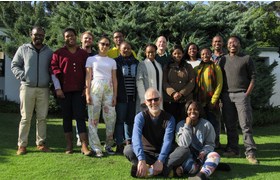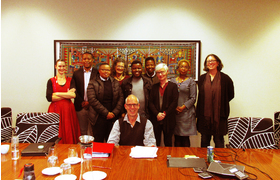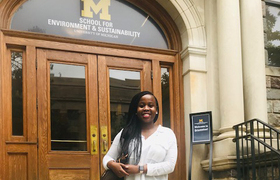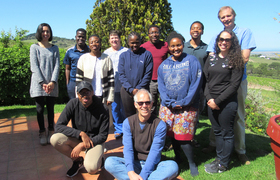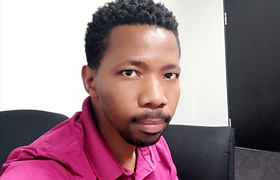Meryl Jagarnath joins the Environmental Health division as nGAP member
03 May 2021 | Story Robert Morrell. Photo Supplied. Read time 6 min.
Meryl Jagarnath arrived at the University of Cape Town (UCT) as a New Generation of Academics Programme (nGAP) lecturer after a period as a postdoctoral fellow at the University of Southampton. Her arrival in Cape Town was delayed by the global lockdown associated with COVID-19, but she is now safely resident and throwing herself into her academic work.
Meryl’s interest and expertise lies in studying the impacts of environmental hazards on the health of people. These hazards include air pollution, drought, heat stress and flooding. The focus of her work is specifically on the impacts on vulnerable populations, such as children, women and the urban poor.
“I was always interested in the way that humans have impacted on nature and also how nature has impacted on humans.”
Coming from Durban
Jagarnath describes herself as a Durbanite.
She completed her schooling in Durban and her undergraduate studies to PhD in environmental sciences at the University of KwaZulu Natal, Westville. She studied environmental science because she “was always interested in the way that humans have impacted on nature and also how nature has impacted on humans”.
She grew up as a Hindu, so she has “never thought of humans as being separate from nature” as she believes that “all forms of life on earth are connected to each other”. From early on she was interested in the health of people and the planet.
Jagarnath’s PhD, which was awarded in 2019, focused on planning for climate change in Durban. It focused on the impacts of heat stress on the city and its population, and how spatial planning could help in the mitigation of and adaptation to those risks. Thereafter, she spent two years as a postdoctoral researcher at the University of Southampton researching climate change risk and vulnerability mapping in Ghana, Kenya and Malawi.
“I particularly enjoy using spatial data and analysis such as geographic information systems to combine data and information from various sources to address complex problems such as climate change and health.”
Family and support
Jagarnath is the youngest in her family and the first to go to university. She has two older siblings, who did not get the opportunity to further their education after school because of financial constraints. Her father works as an artisan and her mom as a housewife.
“They instilled the value of education and supported my dreams.”
She singles out Dr Tirusha Thambiran and Professor Michael Gebreslasie as people who played a huge role in supporting her on her journey and encouraging her to become an academic.
“Both were mentors since my first thesis in honours and have taught me that the kindest people are the most brilliant.”
Jagarnath also acknowledges the funding support of the National Research Foundation (for her MSc) and the South African National Space Agency (for her PhD). That financial support was key to her continuing to postgraduate education and boosted her self-belief and confidence in an academic career.
Coming to UCT
Jagarnath is based in the Division of Environmental Health in the School of Public Health and Family Medicine. With the help of Professor Hanna-Andrea Rother, the head of the division, she has settled down quickly, despite the challenges of lockdown and, more recently, the devastating fire.
“Getting this position was a dream come true as I have wanted to become an academic ever since my first year at university.”
She is looking forward to meeting with the rest of the ‘nGAPpers’ and contributing to UCT’s vision for itself and for wider society. Having already started with her teaching duties, she reports having enjoyed the postgraduate classes that she has been involved in teaching.
“I am looking forward to seeing my students for face-to face teaching soon, hopefully!”
“I am impressed by the level of commitment and responsiveness of students, which has made delivering teaching or discussions online pleasant for me as they are engaged, asking questions and willing to contribute their views. I am looking forward to seeing my students for face-to face teaching soon, hopefully!”
Jagarnath’s introduction to UCT has also had its moments of drama. She was evacuated from her staff accommodation due to the fire, but she was quickly placed in alternative accommodation.
“It was a nerve-racking experience, but I did feel supported by UCT emergency staff and my colleagues during the time. It made me realise how big the UCT community is, and I am proud to be part of it and hope to carry on and provide other emerging academics and researchers with the support that I have been given.”
 This work is licensed under a Creative Commons Attribution-NoDerivatives 4.0 International License.
This work is licensed under a Creative Commons Attribution-NoDerivatives 4.0 International License.
Please view the republishing articles page for more information.
New Generation of Academics Programme (nGAP)
UCT has responded energetically to the New Generation of Academics Programme (nGAP), an opportunity provided by the Department of Higher Education (DHET) to build a new generation of black South African academics. The DHET’s 2015 vision document, “Staffing South Africa’s Universities Framework: A comprehensive, transformative approach to developing future generations of academics and building staff capacity”, proposes a suite of initiatives to address the challenge, with nGAP being the major instrument to increase the numbers of black South African academics.
The programme “involves the recruitment of highly capable scholars as new academics, against carefully designed and balanced equity considerations and in light of the disciplinary areas of greatest need”. The nGAP scholars are appointed into permanent positions where from the outset their conditions are customised to ensure their successful induction into the ranks of established academics.
The DHET provides funding over a six-year period to support the appointment of an nGAP lecturer, and their time is protected to provide the best possible opportunity for the completion of a doctorate degree in the shortest possible time. Once the degree is completed, the nGAP lecturer’s teaching commitments are steadily increased until they shoulder a full teaching load.
Since the first advertisement for nGAP posts in 2015, UCT has been awarded 17 nGAP positions: 5 (Phase 1), 4 (Phase 2), 3 (Phase 3) and 5 (Phase 4). These are distributed across all faculties.
UCT’s nGAP scholars operate as a single cohort, managed and coordinated by Dr Robert Morrell. Lecturers meet for quarterly meetings, writing retreats and various capacity-building activities all designed to support the completion of postgraduate qualifications (particularly doctorates) and to develop records of achievement that will testify to their emergence as self-standing, excellent academics. Each lecturer is mentored by a senior scholar, who provides support and guidance on the challenges that routinely face academics.
The nGAP manager sets great store in building the cohesion of the cohort and encouraging the establishment of new UCT networks while producing a collaborative, mutually supportive and embracing work culture.
According to Dr Morrell, “This group of academics will lead UCT in 15 to 20 years’ time ... Their vision of excellence, of being African and South African, of serving a wider community and producing knowledge for the planet, the continent and the country, will power UCT in years to come.”
Newsletters
In the news




